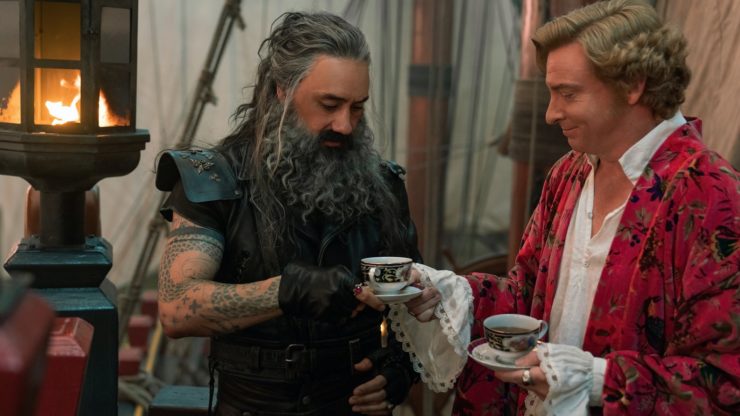Queer heartache has never felt this good.
Every time there’s queer energy in an ongoing genre show it always feels like Schrödinger’s Queerbait—are they going to go for it or am I going to get hurt? Are they leaning into the story they’re telling, or are they going to tell a worse story by ignoring the character dynamics they chose to put onscreen and instead rely on lazy compulsory heteronormativity to take the show in the most predictable possible direction in what posits to be risk avoidance but which is really code for the boring fact of homophobia. Schrödinger’s Queerbait: Is the queer romance dead or alive? Mostly, it’s dead. There are notable exceptions that certainly deserve their due, like She-Ra and Black Sails, and a good amount of books that have swashbuckling canon queer vibes—check out Alex Brown’s excellent piece here for recs—but almost always for genre shows the answer is comphet and hurt.
So when I realized that Our Flag Means Death is actually telling the queer story it felt like it’s telling—fully, and tenderly—it was like the world cracked open in the best way.
It’s mindblowing, dizzying really. Many queer fans of Our Flag Means Death finished the show in a state of shock that most of us haven’t yet left. It feels deeply cathartic and genuinely freeing. There’s this sense of astonished relief, of unfamiliar energy, from not having to bend over backwards for fucking once. We actually get to analyze the show itself, instead of subtext. It’s a new thing, to simultaneously hold all this joy at the actual story and also not have to hold all the tension and implicit shame that usually comes from shipping men in genre fiction that fights really hard to deny the dynamic is there. This show lifts a weight that’s felt nearly ever-present. This time, they gave it to us. It’s here. It’s a queer story from beginning to end, intentional and brimming with heart. After growing up searching for ourselves and our desire in scraps and subtext that gets laughed at or lauded without ever getting to be the actual central storyline—much less multiple storylines. After seeking escape in books and movies about pirates and romance and found families in which we could never find ourselves. After every genre adventure story left us out entirely, or made us the joke, the sidekick, the dead one.
This one’s fucking ours.
The dynamic between Stede Bonnet, the Gentleman Pirate, and Edward Teach’s Blackbeard starts out romantic and then it delivers on that promise. They’re fascinated by each other from the outset. It is both subtext and text. Like Stede letting Ed into his actual secret closet full of dandyish clothes, or Ed seeking intimacy by way of demanding Stede penetrate him with his blade. These moments, in another genre show, would ring to queer viewers but we’d never get follow through. But here, it leads to them swapping clothes, leaving Ed with Stede’s cravat that he keeps on up through the end of the season. Or to Izzy confirming for the viewer that the moment with the blade is one of intimacy. It’s a marvelous thing, to actually get to bask in the unfolding of a story like this. It’s queerness, for queers. It uses the coding and the language, the glances and the symbolism, and then delivers. The show itself actually feels like a queer space: we know we’re safe in it, our desire is safe in it, and all the jokes are for us, not at our expense. When queerness is publicly under threat and the pandemic has taken away so many opportunities for community—this show feels like a gift.
Not only is it an outright romcom, it does the genre exceptionally well. It understands that a love story is in the details. They take the time to build the characters individually, to make us really feel where they are on their journeys and why each is exactly who the other needs. They were both utterly fascinated with stories of each other before they meet. It’s not just attraction. We get to watch genuine, specific affection develop. It’s first love for middle-aged men who’ve lived full lives. Neither has ever really had so much as a friend before. It’s about the two of them falling in love, especially as men raised on opposite sides of suffocating toxic masculinity, but it’s also an exploration of what love itself is. It is not an easy realization, especially for Stede, and that makes it feel all the more earned. Stede admires Ed’s freedom and his swagger, Ed is enamored with Stede’s reckless kindness. The storytelling makes it so palpable that they both find comfort in who they really want to be, within each other. It’s universal, but also a very queer experience, to meet someone with whom you can be the truest version of yourself.
This is an inherently queer story, but it’s also simultaneously about masculinity and monstrosity, and the transformational vulnerability of love. It’s all connected, but they’re not exclusively connected. The story is in some ways about internalized homophobia, but it also delves into actually interrogating internalized misogyny, and what it means to be a man—notably without ever traumatizing a woman to make their point. Another show would’ve written Stede’s wife Mary off or villainized her, and this is much more effective, and fun.
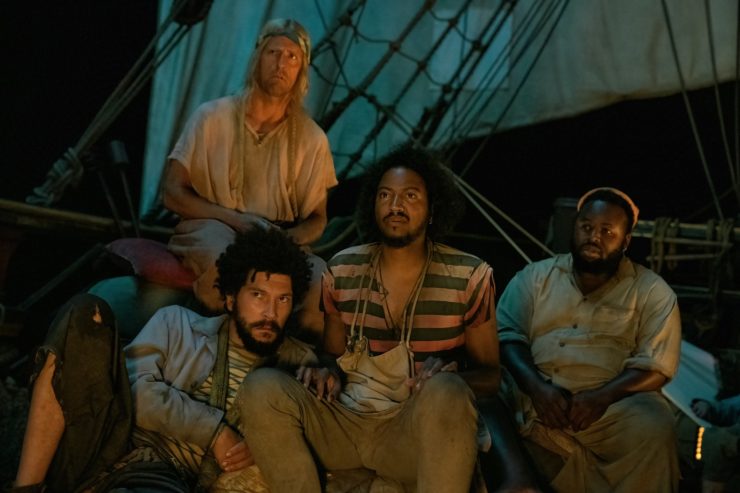
The entire story is one of deliberate compassion, it’s the very fabric of the show. From Lucius supporting Stede and Ed through their rougher patches to his healthy “we don’t own each other” relationship with Black Pete. Olu taking every opportunity to be thoughtful and gentle with Jim, his offering of “if you want…I could be family,” that’s the core of it—the very queer structure of a chosen family. Stede couldn’t be himself in a cishet family. He made room for honest emotions aboard The Revenge, and it didn’t take long for the rest of the crew to find belonging on that ship. Their dynamic is tender, and legibly queer—a challenge to the machismo and toxic masculinity of the rest of pirate culture, as well as an open critique of cishet white colonizer masculinity. Not only does the entire structure of The Revenge exemplify masculinities that make no space for toxic cruelty—including trans, gender non-conforming, body diverse masculinity—it renders that sort of behavior absurd and out of place. The show emphasizes that while Stede’s efforts are clumsy, the environment of kindness and support he creates is effectual, because it feels so much better than the self-punishment most pirates swear by.
This is a story about two men, both traumatized by their fathers, going through mid-life crises, and that makes the romance all the more potent. They’re desperately bored with their lives, both of them nearly ready to die with it. They’re functionally in the same emotional space, though they’re coming at it from opposing sides.
The show explores this beautifully through the parallel imagery of the lighthouse and the Kraken. It seems like a straightforward dichotomy, but nearly nothing on this show has such a simple meaning, which is one of its many strengths. Stede was meant to be a “lighthouse” for his family, to act as a guiding beacon. He sees himself as a failure at this, but as Ed points out, you’re actually meant to avoid lighthouses, so you don’t crack up on the rocks. Stede is a lighthouse, in the truest sense, and the season takes him on a journey to becoming one for his new chosen family. He stubbornly guides his crew with single-minded focus. He’s a beacon, obvious and brazen yet largely defenseless, and Ed finds out soon enough what happens when someone gets too close.
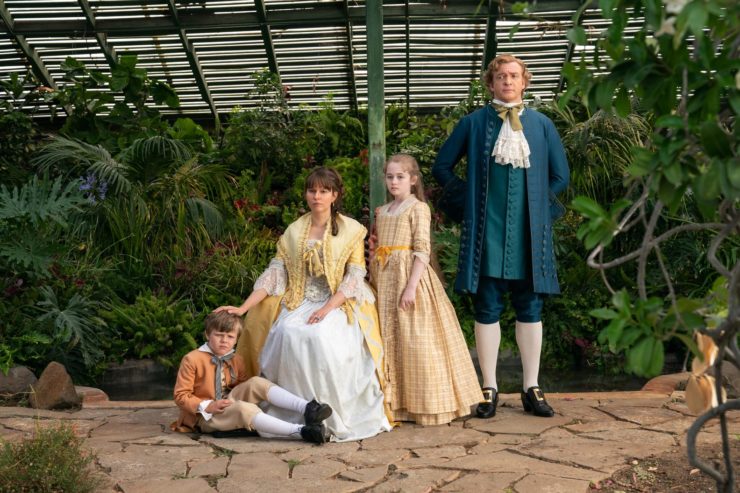
Much of Stede’s story centers on fear. His father called him a “lily-livered little rich boy,” and Captain Badminton mocks Stede for it even in death. As he convalesces, he keeps saying “coward…I was a coward.” He ran away from his life in the night and abandoned his family. He took, essentially, the easiest and most selfish route. His choice to go back to Mary is fraught, but crucially, he’s not running away anymore. Ed asks him to leave behind their previous lives entirely, and Stede needs closure before he can. At first it seems almost like another cowardly move, but in fact, he is actually doing what he’s been too scared to do since he left, what’s been haunting him through the Badmintons—confronting Mary and the children. And he can only do that because Ed made him brave. Not running away anymore. Running toward.
Meanwhile, Blackbeard is known to be fearless to the point of near-inhumanity. And indeed, there’s a level to Blackbeard that delights in violence and aggression. At the same time, not only is he bored and unfulfilled by it, he reveals that there’s a deeper, traumatized part of him that’s afraid of it. We come to understand that the Kraken is Ed himself. It’s a trauma response, a survival mechanism, a form of distancing. It’s the story he’s told himself so he doesn’t have to confront that he had to murder his father when he was only a child. The sounds of a fake Kraken are enough to render Captain Blackbeard vulnerable and sobbing in a bathtub. He was meant to be the Kraken again that night, to murder Stede Bonnet. And he doesn’t want to be. As Jim had said, “when you kill, you die as well.” Not only does he hate that part of himself, he’s terrified of it.
“Fear is the most powerful emotion,” Ed says. “Turn your enemy’s worst fear against them and you’ll own them.” What frightens Ed Teach? Stede getting hurt. We see Ed truly terrified twice: sobbing in that bathtub because he doesn’t want to kill him, and when the firing squad takes aim at Stede. Fearless Blackbeard, brought to terror because for the first time, he has something precious he doesn’t want to lose.
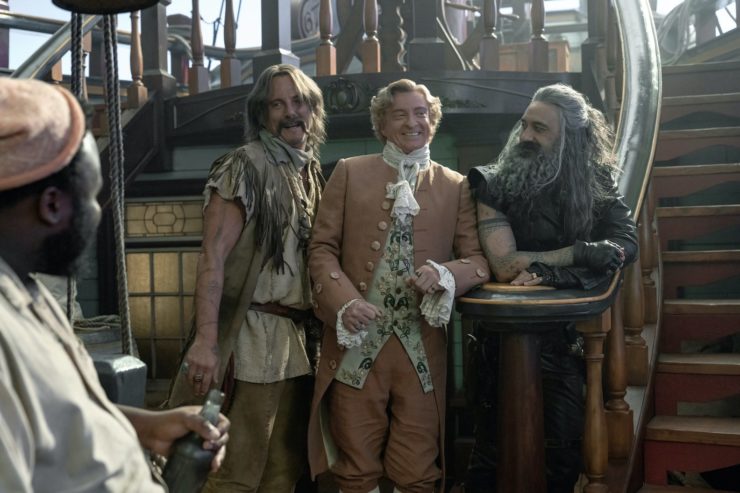
Calico Jack’s episode, “We Gull Way Back,” really clarifies this narrative. He reminds Ed of how their former captain treated them “worse than dogs,” and scoffs when Ed says he’s mellowed. Jack embodies how toxic masculinity punishes itself, how it didn’t leave Ed room for processing or grief, and thus the Kraken was born. Refreshingly and interestingly, queerness is not positioned as weakness on these seas. This is accurate to the time period, as sexual encounters between men at sea were not surprising, but it’s uncommon for a mainstream historical to reject the heteronormative default so openly. Jack outright states that men fucking men is “nothing to be ashamed of.” He also says that “anything goes at sea,” so that the viewer can understand both that it doesn’t, on land, and also that queer sex is common among pirates—and not only on The Revenge. No one but Izzy seems to struggle with the experience of queer desire. No, for pirates like Ed, Jack, and Izzy, the weakness is love itself. It’s softness, it’s the vulnerability that comes with intimacy. It’s wanting to be seen and held for who you are, instead of having to fight to prove yourself. Though we never see Izzy and Jack interact, we don’t get the sense that Izzy feels the same murderous, jealous loathing toward Jack as he does for Stede, despite Jack’s obvious history with Ed. It’s easy to picture the dalliances between Jack and Ed as an extension of their fratty roughhousing. Meanwhile, before Stede knows who Ed is, Stede tells him he’s a good man, and then two episodes later Ed’s crying to him “I’m not a good man. That’s why I don’t have any friends.” Crucially, Jack seems to clarify this by shouting at him “what kind of pirate has a friend? We’re all just in various stages of fucking each other over!” Even Izzy wouldn’t even count himself necessarily as Ed’s friend. He serves Blackbeard and that same violent hierarchy. Izzy, for Ed, is representative in many ways of what life with Mary was like for Stede—a place where men are punished for being themselves.
Stede is a threat to the toxic masculinity Ed was shaped by because he’s a man who likes comfort and earnest kindness, because he’s exactly the sort of friend Ed never thought he was allowed to have. Stede is a living example that there is another way to survive. At first, Izzy is the only person who has the intimacy of calling Blackbeard “Edward,” but by the end of the season he’s vehement about serving “Blackbeard,” which emphasizes just how fundamentally “Edward” has changed. Somewhere between Jack’s whippies and the passive aggressive classist cruelty of the aristocracy, Stede Bonnet has carved masculinity for himself in the shape of a sort of gentle chaos, and that appeals to a tired, numb Edward Teach very much. Ed seeks the freedom and comfort in which to be himself.
Meanwhile, Stede’s story is so classically queer I was, as I’d mentioned, very worried I was getting set up to be queerbaited. Stifled and bored by the confines of heteronormativity and performed masculinity, he seeks to escape by taking a shipful of men onto the wild seas, where “anything goes,” acting out his pirate fantasy. His naivete would be almost unbearable if he wasn’t so charming and earnest. I love that Olu has to spell out for him and the audience that most people, especially men of color, don’t become pirates for fun, but because they have no other choice. And I love that Stede has to have his own moment of realization the first time things start to get slightly bloody—“I’m not a pirate,” he realizes, “I’m an idiot!” To him, piracy represents adventure and literal unruliness. He idolizes the fantasy of their specific shape of masculinity, fearless and powerful, and he too yearns for the freedom and comfort in which to be himself. Part of what separates Stede’s story from a straightforward queer allegory is that he doesn’t realize that’s what it is yet! It’s not the only thing he craves from the sea, but it ends up being what he’s most missing.
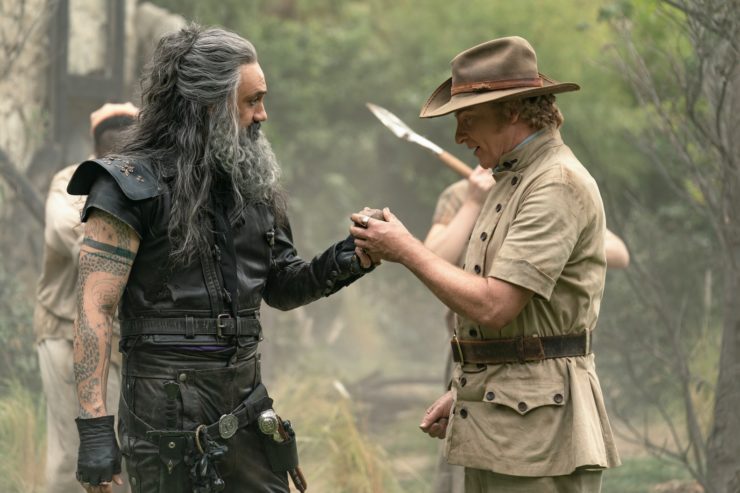
Both of them were, with each other, the versions of themselves they never knew they were allowed to want to be.
The story between them isn’t straightforward. There’s complexity driving both of their arcs, and yet when they look at each other, it’s the clearest, truest thing in the world. The intensity of the finale speaks to the intensity of their connection, and so even though it’s a tragedy in the truest sense, it’s deeply, rewardingly cathartic to watch a queer love so storm-fierce it wrecks everything in its wake. I ache for messy queer romance stories just like this, that feel created for queers who have loved in secret for so, so long. Stede’s oh moment is out of the swooniest fanfiction, which is to say it feels like an answer to the way queer creators have been carving ourselves into the canon for generations. At last, we don’t have to make it gay. The subtext is text, and it is not sanitized, it is not dismissive. It takes up space.
It’s disarming, too, because I’m so accustomed to flinching at queer tragedy, as well as cringing when a huge plot point can be boiled down to misunderstanding or bad timing. Yet the season finale shows how rare and wonderful it is for queer tragedy to be written in a way that is anything but exploitative. This one is so devastatingly well-executed because we get to experience a raw, rare, visceral evocation of queer male heartbreak. The posturing, the defensive mask of cruelty, the hyperviolent masculinity hiding just how broken and lost Ed is truly is. It’s all the worse now because he knows what softness feels like, he knows what peace feels like, and to Ed, it’s gone forever, and the show makes room for him to feel every moment of that tragedy.
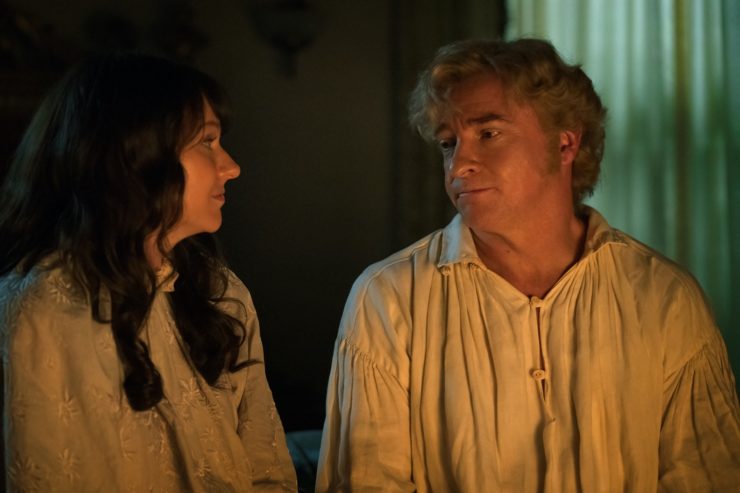
Ed performing the Kraken for everyone else yet sobbing in Stede’s cabin, that’s for us. Stede at last naming what he feels as love, because he’d never had any context for it before, that’s for us. They give specificity and intention to the tragedy of Ed and Stede entirely ready to give up everything for each other, just a few precious weeks off. In Stede, Ed finds someone who he believes would never hurt him. He was the one person Ed thought he could trust, he signed over his entire life for him. That’s why Stede’s departure devastates him so much. Ed looks at Stede like he’s something precious. Stede can’t quite recognize what that means not only because he doesn’t have any context for what love actually is, but because he doesn’t think he deserves that yet. He ends up hurting Ed exactly as he thought he might have hurt Mary—worse, even. Because when Chauncey called Stede Bonnet a monster, he believed it. How could he understand how his actions would destroy Ed when he hated himself that much, when he thought he deserved to suffer because it was the right thing to do? It is, in fact, a similar reason as to why Ed left with Jack in the first place: “you were always going to realize what I am.” It’s not so easy to shake off the shape of who you once thought you always had to be. Ed wanted to run away from their previous lives because he doesn’t want to confront his trauma, the Kraken. Stede can’t run away with him because he has to confront his lighthouse, what he believes is his own monstrosity. Now that Ed is once again acting as the Kraken, I suspect he’ll have to have a similar confrontation. I can’t wait. Queer stories don’t often get to have romcom tropes done like this: thoughtful, specific, and devastating.
Their world is not set up to give anyone both freedom and comfort. Neither of these men are allowed to even want it. And they find it in each other.
They sacrifice everything for each other, and we can tell it’s anything but a loss.
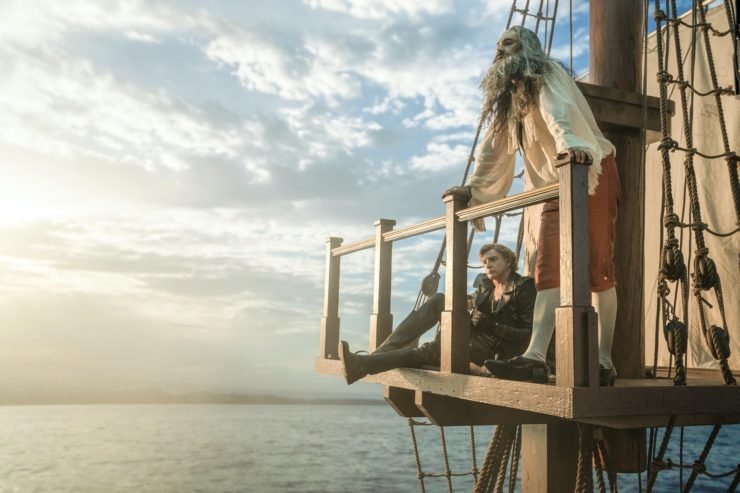
Something original, indeed. The nuances here are really fucking interesting. Our Flag Means Death doesn’t only tell a gay story for gay’s sake—which it does, several times over, which is also wonderful and necessary—it also uses a gay story to tell a universal story about love. While there’s certainly room and need for stories that are “just” about queerness, it does make this one even richer and more accessible to a wider audience—and simultaneously for queer viewers, it goes beyond “gay 101” in a way commercial genre shows haven’t gotten a ton of yet, not as a central storyline.
It’s also queer on the level of power dynamics. It’s Blackbeard, with more physical and social power, who’s the vulnerable one in the relationship. It’s Stede, the emotional dandy, who’s not emotionally ready first. He’s the one who pulls rank as Captain to get Ed to stand down or join him on a treasure hunt, and Ed obeys. They don’t fit neatly into a stereotypical power dynamic by any means, which makes their relationship feel all the more authentic, and the story feel more “by queers, for queers.”
Ed thinks he wants wealth and finery, Stede piracy and adventure. But what they both really want is to be seen and understood. On instinct, they protect each other. It’s a very queer experience, the tenuous way wanting to be each other eases into wanting each other. It happens like daybreak, a gentle, natural thing, and then suddenly it’s the most spectacular thing to ever happen to you. They discover how much they have in common—and they change each other, irrevocably. This is a genuine romance, a story about learning to love and learning to be loved. They actually are perfect for each other. That’s why they are capable of hurting each other so badly.
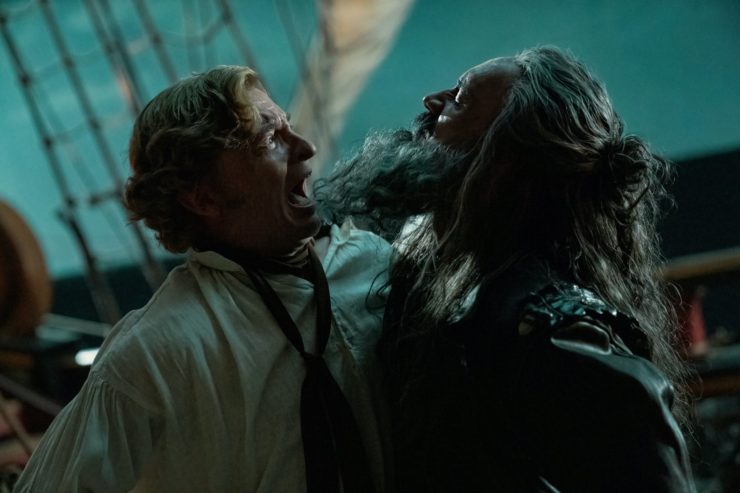
Even though the season ends on such a classically tragic note, there’s a fierce sort of queer catharsis to be found within it. It works, it’s generated such a powerful viewer response, because the show takes their heartache so, so seriously. Separated, they sour, inheriting each other’s wounds. They manifest each other’s coping mechanisms in the wake of their wanting. Stede gets drunk and destructive, Blackbeard wallows in his sorrow, almost drowning in it.
Ed spent his whole life believing he wasn’t allowed to be soft, to have anything nice, and Stede seems to prove it by abandoning him. He becomes the Kraken again, the thing he feared most, the identity wrapped in death and terror, because lingering in that lack of softness hurt even more, and because Izzy makes it clear it’s a risk. He claws his way into becoming a ruin of himself because he loves that deeply. Despite his facepaint and his viciousness, we still see him sobbing at the end. This is a scarred man who didn’t know how intensely he could hurt until he found someone he never wanted to lose. And then there’s Stede, performing his fuckery just as Ed taught him. He’s ready at last, to leave behind everything for Ed. It’s the second time he leaves his home to turn pirate. This time when he drags his boat out to sea, he brings no fancy clothes, no books, no one to row for him. He’s a changed man, confident and sure in what he needs, because he loves that deeply. We’re building to quite the confrontation of a reunion, and I can’t wait to see it.
Many, many queer people have had a moment like Ed, painting on the face of the Kraken despite yourself. It’s too hard to be who you truly are. It takes strength and vulnerability to be soft, to ask for comfort, to offer your heart in love. In a world where love is a risk and, especially for men, construed as a weakness, it’s easier to put on the mask of a monster and pretend it’s armor than to let someone see you for who you are again.
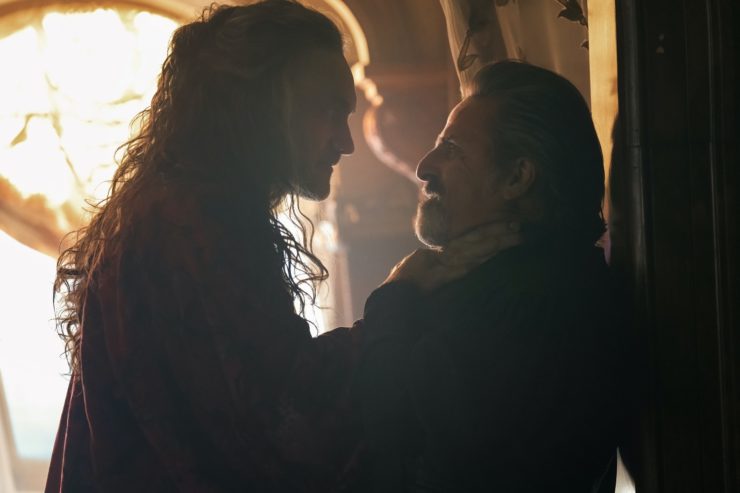
And all queer people deserve a moment like Stede, setting out to sea. A moment of absolute clarity and certainty. Pursuing the truth of yourself and your heart, buoyed by support and newfound courage. That scene is breathtaking. Queer love is wonder. Queer love is triumph, fresh air after a lifetime of choking on yourself. Queer love is resistance, deliberate disobedience because the rules are fucking stupid, and, as we can see on Stede’s face, queer love is a goddamn relief.
Their love is not careless. This is thoughtful, vibrant chemistry. They both find in each other someone who’s genuinely interested in who they are instead of who they’re supposed to be, for the first time in their lives. They understand each other. They’re genuinely fascinated with the specifics of the other’s personality. They protect each other, they listen to each other, they respect each other. It’s a love story that understands the very human weight of love. How it can buoy you or be the anchor dragging you into the worst parts of yourself. Their relationship is both the most natural thing in the world and something that has the potential to end it.
This show feels revelatory. Queer compassion embedded in every choice they made. We get to be the central plot here. The driving force in something so epic and fun, and I think most fans are sort of still figuring out how to handle that sort of joy. It’s heartbreaking to realize how much this means to us, because we’re recognizing just how little we’ve had. I’m queer, mixed-race, and nonbinary, and I’m very unaccustomed to finding so much of my heart in so many places of a story. This show is full of queer moments that are romantic and sexy. It brims with queer winks that we’re accustomed to reading as gay, but this show actually says yep, mate, you read that right, it’s canonically gay. You don’t have to do the work of fitting yourself into this narrative. It’s for you. It’s for us.
Our Flag Means Death seems determined to give us as much queer joy and catharsis as possible. Gotta call out just a few scenes, because they’re genius: we get a clothing swap right off the bat, in which they even exchange rings. Stede shows Ed into his “secret closet.” Ed admires the little ship Mary found stupid. That moonlight moment of “you wear fine things well,” which Ed had been waiting his whole life to hear, and the way he almost leans in, which is functionally a charged scene out of a regency romance. “Stab me,” Ed says, baring himself in wild, homoerotic trust, teaching Stede how to defend himself in a way that will come to save his life. Stede and Mary sit across from each other at the dinner table, while Stede and Ed share a corner. Stede shares private breakfasts with Ed, preparing him tea just as he likes, while Calico Jack fails to literally whip him up breakfast. The foot touch and the wink, “you came back!” “never left,” the two of them lost in the peace of each other’s eyes as their world falls apart around them. “Act of Grace!” cried with raw desperation, Ed bodily putting himself between Stede and the firing squad, giving up everything he’s ever known to protect him. “You don’t have to do this.” “Yeah, I know I don’t.” There’s fierce, powerful romance here, as well as natural, easy banter. They relax around each other. They defend each other. They’re genuinely fond.
Then there’s an entire essay’s worth of the other couples on the show, that hat touch and “I could be your family,” stockroom hookups and whittled fingers, “have you ever been sketched?” Izzy and his tortured desire to be dommed by Blackbeard, while Stede brings out the most joyfully submissive parts of Ed. When I first started the show, I was worried that we were getting queer “side characters” as compensation for queerbaiting the central couple, and I couldn’t have been more wrong. All those characters are masterfully developed, making for an entire ship full of rich and different queer experiences.
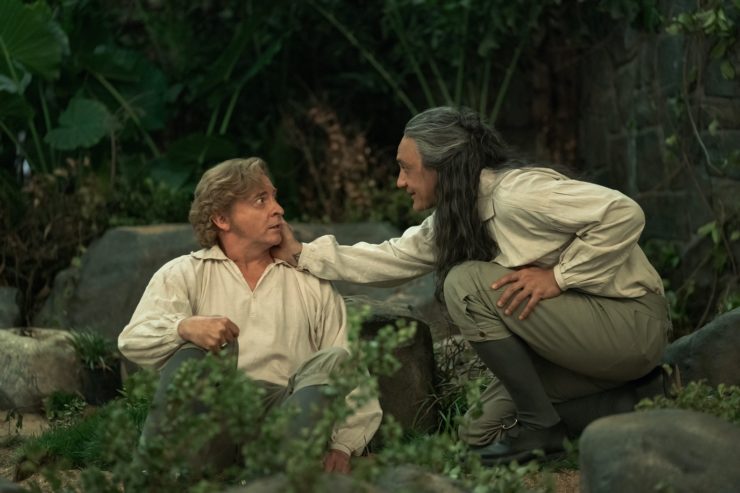
And finally, we come to that kiss. That charged, tender, perfect kiss, intentional as the rest of the show and crafted with such palpable care. It wasn’t a Hollywood kiss, and thank goodness because it would’ve rang so false if it were. Beard stripped away, no ruffles, no frills. Not Blackbeard, not a gentleman. Two men watching the sun set on the best era of their lives so far, and navigating what’s to come. Stede wasn’t sure of himself yet, but he was sure he wanted that kiss, even if he didn’t fully know what it meant. And Ed could not have been more sure of anything in his life. That kiss, that kiss, that made the entire story unambiguous. This is a story about middle-aged men who have hurt people. They have lived full lives, and they have found each other. I trust that somewhere down the line, when they find their way to each other again, we’ll get another kiss and we’ll see how much they’ve both grown within it. In the meantime, this was perfect. Warm with sunset, and a tenuous peace. Defiant and gentle at once. Its own sort of closure for the two of them, and for us. We can see it in their eyes—even with what happens next, some things are sure.
Our Flag Means Death is earnest and thoughtful, deliberate and deliberately compassionate. I’m so sensitive to queer heartbreak, and even though this season effectively leaves us there, I don’t feel that they’ll leave it a tragedy, so long as they’re given the opportunity. They’ve struck that delicate balance of catharsis even without resolution, because they’ve given us queer joy centered so intentionally, queer love told so intricately, and queer heartache taken so seriously. At the time I’m writing this, we still don’t have word on renewal, but I desperately hope that by the time you’re reading this, we have a second season confirmed—please, HBO, give them the opportunity. It’s been a long while since I’ve trusted showrunners and writers like this as a queer viewer.
Queer folks are exhausted. The world is hostile to queer and trans love, and we are working to undo that default, but the work is tiring and often terrifying. A show like this reminds us of what is possible. It makes us feel seen. It makes room for our pain and our joy, our messiness and our desire.
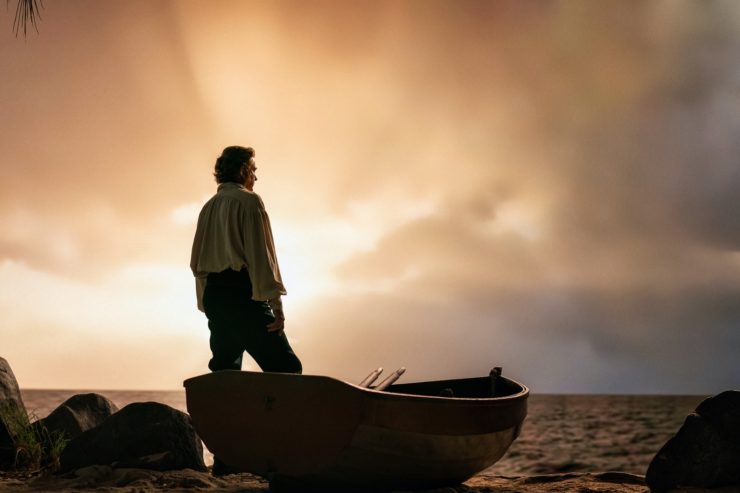
A respite, daybreak after a storm. A lighthouse in the thralls of a sea monster, a myth and a found family in which for once, we get to belong. A sharply saving thing.
In the clearest, most subversive sense—this story is an act of grace.
Maya Gittelman is a queer Fil-Am and Jewish writer and poet. They have a short story forthcoming in the YA anthology Night of the Living Queers (Wednesday Books, 2023). She works in independent publishing, and is currently at work on a novel. Find them on Twitter (@mayagittelman) or Instagram (@bookshelfbymaya).










